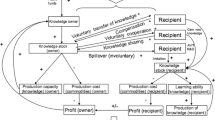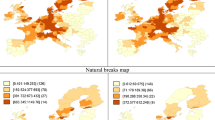Abstract
This study contributes to existing literature on the relationship between productivity and innovation through the knowledge spillover effects. To this end, we consider both a theoretical model and an empirical analysis in Russia. The investigation is based upon a dataset composed of 85 Russian regions for the period 2010–2014. In particular, the effect of R&D Spillovers are analysed through the use of spatial econometric techniques. In so doing, we have allowed the productivity of each region to be affected by the productivity of nearby regions. Results show that R&D significantly affects Russian regions productivity and that productivity spillover across regions matter.




Similar content being viewed by others
Notes
See more on these initiatives as well as on cluster policy on the portal of Russian Cluster Obsevatory (launched by Institute for Statistical Studies and Economics of Knowledge (ISSEK))—the leading Russia scientific, methodological, analytical and consulting centre specializing in research in the field of cluster policy. http://cluster.hse.ru/info/.
E.g. easily downloadable files with aggregated statistical data on R&D and Innovation activity in Russia are available for free here (in Russian Language interface): http://www.gks.ru/wps/wcm/connect/rosstat_main/rosstat/ru/statistics/science_and_innovations/science/#.
As mentioned on “HSE data books” portal https://www.hse.ru/en/primarydata/ “These data books present the results of statistical innovation surveys in the Russian Federation. They contain internationally compatible indicators characterizing the level of innovative activity in industry and services. These publication covers statistical data reflecting innovation expenditure and output, co-operational linkages, and factors hampering innovation. Specific chapters are devoted to ecological innovation and innovative activities in the regions of the Russian Federation. International comparisons with a wide range of innovation indicators are provided as well. These data book include information of the Federal Service for State Statistics, Organisation for Economic Co-operation and Development, European Commission, Eurostat, national statistical agencies, and results of own methodological and analytical studies of the HSE Institute for Statistical Studies and Economics of Knowledge”. Latest issue of “Indicators of Innovation in Russian Federation (2015)” in English can be downloaded here https://www.hse.ru/en/primarydata/innov2015. The latest Russian issue of “Indicators of Innovation in Russian Federation (2017)” can be downloaded here: https://issek.hse.ru/news/204006500.html.
From a statistical perspective, Moran’s I is a measure of spatial autocorrelation which is characterized by a correlation among locations in space. Spatial correlation is more relevant than one-dimensional autocorrelation since it is multidimensional. In particular, Moran’s I is defined as: \(I = \frac{z'Wz}{z'z}\), where z is an N—vector of standardized regions, W is an N × N row-standardized spatial weight matrix and N is the number of observations.
We use ‘xsmle’ STATA command (2017) for the estimation procedure.
References
Abashkin, V., Boyarov, A., Kutsenko, E.: Cluster policy in Russia: from theory to practice. Foresight Russ. 6(3), 16–27 (2012)
Acs, J.Z., Audretsch, D.B.: Innovation, market structure, and firm size. Rev. Econ. Stat. 69(4), 567–574 (1987)
Aganbegyan, A.G., Mikheeva, N.N., Fetisov, G.G.: Modernization of the real sector of the economy: spatial aspects. Reg. Res. Russ. 3(4), 309–323 (2013)
Akinfeeva, E.V., Abramov, V.I.: The role of science cities in the development of the national innovation system in Russia. Stud. Russ. Econ. Dev. 26(1), 91–99 (2015)
Aldieri, L., Vinci, C.P.: The role of technology spillovers in the process of water pollution abatement for large international firms. Sustainability 9, 868 (2017). https://doi.org/10.3390/su9050868
Andreeva, E.L., Simon, H., Karkh, D.A., Glukhikh, P.L.: Innovative entrepreneurship: a source of economic growth in the region. Econ. Reg. 12(3), 899–910 (2016)
Anselin, L.: Spatial Econometrics: Methods and Models. Kluwer Academic Publishers, Boston (1988)
Antonenko, I.: Innovation development sectoral trajectories of the South Russian regions. Reg. Sect. Econ. Stud. 14(2), 31–38 (2014)
Baburin, V.L., Zemtsov, S.P.: Geography of innovation processes in Russia. Vestnik Moskovskogo Universiteta, Seriya 5 Geografiya 5, 22–32 (2013)
Bakhtizin, A.R., Akinfeeva, E.V.: Comparative estimates of innovation potential of the regions of the Russian federation. Stud. Russ. Econ. Dev. 21(3), 275–281 (2010)
Bek, M.A., Bek, N.N., Sheresheva, M.Y., Johnston, W.J.: Perspectives of SME innovation clusters development in Russia. J. Bus. Ind. Mark. 28(3), 240–259 (2013)
Bretschger, L., Lechthaler, F., Rausch, S., Zhang, L.: Knowledge diffusion, endogenous growth, and the costs of global climate policy. Eur. Econ. Rev. 93, 47–72 (2017)
Cohen, W.M., Levinthal, D.A.: Absorptive capacity: a new perspective on learning and innovation. Adm. Sci. Q. 35(1), 128–152 (1990)
Crescenzi, R., Jaax, A.: Innovation in Russia: the territorial dimension. Econ. Geogr. 93, 66–88 (2017)
Dezhina, I.: Policy framework to stimulate technological innovations in Russia. J. East-West Bus. 17(2–3), 90–100 (2011)
Eferina, T., Kochkina, N., Lizunova, V., Prosyanyuk, D.: Systemic barriers to innovative business in Russia. Public Adm. Issues 2, 49–71 (2016)
Gokhberg, L., Kuznetsova, T.: S&T and innovation in Russia: key challenges of the post-crisis period. J. East-West Bus. 17(2–3), 73–89 (2011a)
Gokhberg, L., Kuznetsova, T.: Strategy 2020: new outlines of Russian innovation policy. Foresight Russ. 5(4), 8–30 (2011b)
Gokhberg, L., Roud, V.: Structural changes in the national innovation system: longitudinal study of innovation modes in the Russian industry. Econ. Change Restruct. 49(2–3), 269–288 (2016)
Golova, I.: Problems of regional innovation strategy forming. Econ. Reg. 1(3), 77–85 (2010)
Golova, I.: Building the effective innovation policy in the regions of the Russian Federation as a prerequisite for socio-economic growth. Econ. Reg. 1(2), 103–111 (2011)
Griliches, Z.: Issues in assessing the contribution of research and development to productivity growth. Bell J. Econ. 10, 92–116 (1979)
Indicators of Innovation in the Russian Federation: 2015: Data Book; Ditkovsky, K., Fridlyanova, S., Gokhberg, L., et al.: National Research University Higher School of Economics, p. 320. HSE, Moscow (2015)
Indicators of Innovation in the Russian Federation: 2017: Data Book; Gorodnikova, N., Gokhberg, L., Ditkovskiy, K., et al.: National Research University Higher School of Economics. HSE, Moscow (2017) [in Russian]
Ivanov, V.V.: Innovative territory as a basic element in the spatial structure of the national innovation system. Reg. Res. Russ. 6(1), 70–79 (2016)
Kaneva, M.A., Untura, G.A.: Diagnostics of innovative development of Siberia. Reg. Res. Russ. 4(2), 105–114 (2014)
Kazantsev, S.V.: Dynamics of innovative activity in Russian regions. Reg. Res. Russ. 3(1), 12–20 (2013)
Kihlgren, A.: Promotion of innovation activity in Russia through the creation of science parks: the case of St. Petersburg (1992–1998). Technovation 23(1), 65–76 (2003)
Klochikhin, E.A.: Russia’s innovation policy: stubborn path-dependencies and new approaches. Res. Policy 41(9), 1620–1630 (2012)
Klochikhin, E.A.: Innovation system in transition: opportunities for policy learning between China and Russia. Sci. Public Policy 40(5), 657–673 (2013)
Komkov, N.I., Selin, V.S., Tsukerman, V.A., Goryachevskaya, E.S.: Problems and perspectives of innovative development of the industrial system in Russian Arctic regions. Stud. Russ. Econ. Dev. 28(1), 31–38 (2017)
Kravchenko, N.A., Kuznetsov, A.V.: Problems in implementing scenarios of innovative development in Siberia. Reg. Res. Russ. 4(4), 355–363 (2014)
Kutsenko, E.: Pilot innovative territorial clusters in Russia: a sustainable development model. Foresight Russ. 9(1), 32–55 (2015)
Kuznetsov, S., Mezhevich, N., Lachininskii, S.: The spatial recourses and limitations of the Russian economy modernization: the example of the North-West macro region. Econ. Reg. 1(3), 25–38 (2015)
Lenchuk, E.B., Vlaskin, G.A.: A cluster-based strategy for Russia’s innovative development. Stud. Russ. Econ. Dev. 21(6), 603–611 (2010)
LeSage, J., Pace, R.K.: Introduction to Spatial Econometrics. Chapman & Hall/CRC Press, Boca Raton (2009)
Lesnik, A., Mingalyova, Z.: The development of innovation activities clusters in Russia and in the Czech Republic. Econ. Reg. 3, 190–197 (2013)
Leydesdorff, L., Perevodchikov, E., Uvarov, A.: Measuring triple-helix synergy in the Russian innovation systems at regional, provincial, and national levels. J. Assoc. Inf. Sci. Technol. 66(6), 1229–1238 (2015)
Makkonen, T.: National innovation system dynamics in East Central Europe, the Baltic countries and Russia. In: Geo-Regional Competitiveness in Central and Eastern Europe, the Baltic Countries, and Russia, pp. 32–56. IGIGlobal, Hershey (2014)
Mariyev, O., Savin, I.: Factors of innovative activity in Russian regions: modeling and empirical analysis. Econ. Reg. 1(3), 235–244 (2010)
Pelyasov, A.N., Kuritsyna-Korsoyskaya, E.N.: Geographic dimension of innovation activity. Izvestiya Akademii Nauk, Seriya Geograficheskaya 2, 8–16 (2009)
Petrov, A.P.: Regularities of formation regional cluster initiative. Econ. Reg. 1, 133–142 (2013)
Romanova, O.A., Grebenkin, A.V., Akberdina, V.V.: Effect produced by innovation dynamics on the development of regional economic system (case study of Sverdlovsk and Novosibirsk oblasts). Reg. Res. Russ. 2(3), 214–224 (2012)
Ryumkin, A.I.: Development of innovative clusters based on business-government partnership using the example of Tomsk. Stud. Russ. Econ. Dev. 20(4), 400–409 (2009)
Schumpeter, J.A.: Capitalism, Socialism and Democracy. Harper and Brothers, New York (1942)
Tkachenko, E., Bodrunov, S.: Development of the knowledge economy and regional innovation policy: Russian practice. In: European Conference on Knowledge Management, vol. 3, pp. 964–973. Academic Conferences International Limited, UK (2014)
Tobler, W.R.: A computer movie simulating urban growth in the Detroit region. Econ. Geogr. 46, 234–240 (1970)
Untura, G.A.: Strategic support of the Russian regions: problems of the assessment of the status of innovative territories. Reg. Res. Russ. 3(2), 153–161 (2013)
Acknowledgements
The article was prepared within the framework of the Basic Research Program at the National Research University Higher School of Economics (HSE) and supported within the framework of the subsidy granted to the HSE by the Government of the Russian Federation for the implementation of the Global Competitiveness Program. The authors are grateful to Editor and two anonymous reviewers whose comments greatly improved the quality of the paper. The results, conclusions, views or opinions expressed in this paper are only attributable to the authors.
Author information
Authors and Affiliations
Corresponding author
Appendix
Appendix
See Table 4.
Rights and permissions
About this article
Cite this article
Aldieri, L., Kotsemir, M.N. & Vinci, C.P. Knowledge spillover effects: empirical evidence from Russian regions. Qual Quant 52, 2111–2132 (2018). https://doi.org/10.1007/s11135-017-0624-2
Published:
Issue Date:
DOI: https://doi.org/10.1007/s11135-017-0624-2




